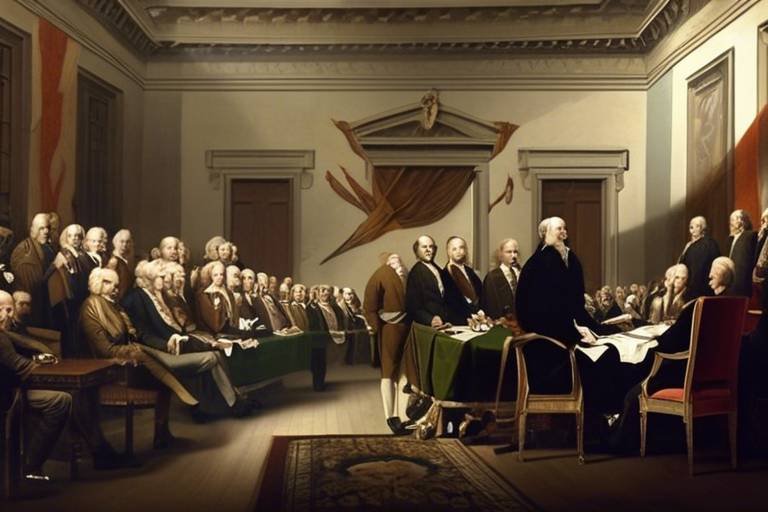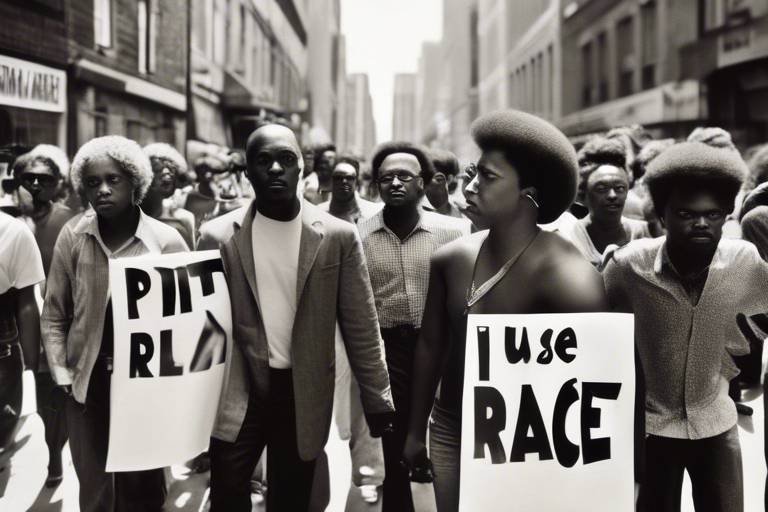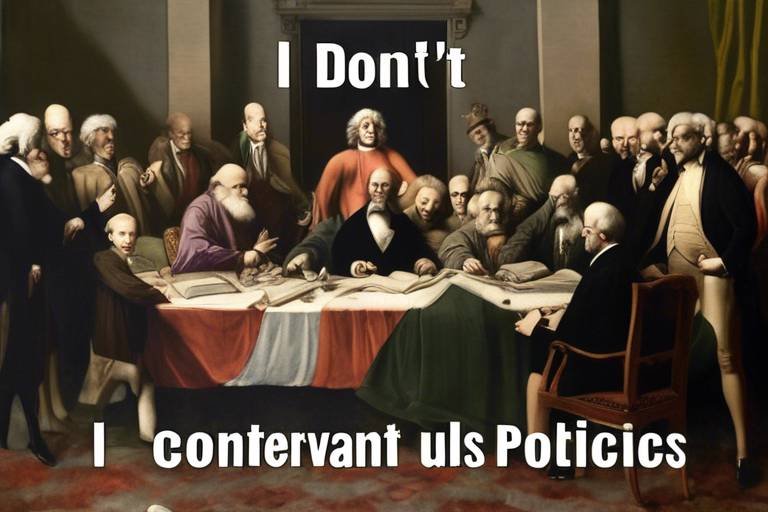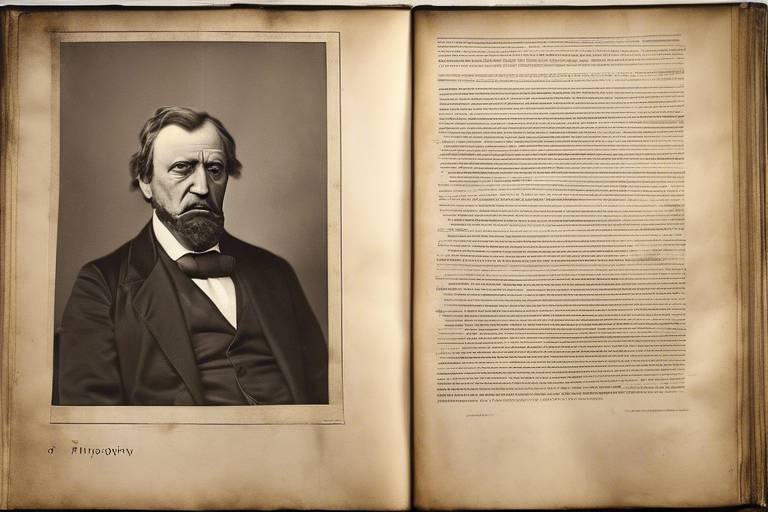The Vision of Politics in Ancient Philosophy
The exploration of politics in ancient philosophy is like peeling back the layers of an onion; each layer reveals profound insights that continue to resonate in our modern political landscape. Thinkers like Plato, Aristotle, and the Stoics laid the groundwork for political theory, shaping our understanding of governance, justice, and ethics. Their ideas are not just relics of the past; they are vibrant threads woven into the fabric of contemporary political discourse. Have you ever wondered how the concepts of democracy, virtue, and civic responsibility emerged? Well, let’s embark on a journey through time to uncover the foundational ideas that have influenced political thought for centuries.
At the heart of ancient political philosophy lies the belief that politics is not merely about power but about creating a just society. Plato's vision of an ideal state, as articulated in his seminal work, The Republic, emphasizes the pursuit of justice and the critical role of philosopher-kings. These rulers, steeped in wisdom and virtue, were seen as the ideal guardians of society, ensuring that the needs of the community were met. This notion challenges us to reflect on the qualities we seek in our leaders today. Are we looking for wisdom, or are we swayed more by charisma and popularity?
Aristotle, on the other hand, took a more pragmatic approach. His political realism, grounded in empirical observation, provided a counterpoint to Plato’s idealism. Aristotle classified governments into various forms, exploring what constitutes the best life for citizens. His emphasis on the polis—the city-state—as a natural community highlights the importance of civic engagement and responsibility. In a world where individualism often reigns supreme, Aristotle's ideas remind us that our well-being is intrinsically linked to the health of our communities.
Moreover, Aristotle's exploration of virtue and governance reveals a profound understanding of the moral character required for effective leadership. He argued that good governance is rooted in ethical principles, suggesting that the integrity of leaders directly impacts the quality of political life. This perspective raises an intriguing question: Can we truly separate morality from politics? As we navigate the complexities of modern governance, Aristotle's insights encourage us to consider the ethical implications of our political choices.
In the realm of political critique, the Cynics, led by figures like Diogenes, challenged societal norms and conventions. Their radical views questioned the legitimacy of established political structures, advocating for a return to simplicity and virtue. This counter-narrative invites us to reflect on our own political engagement. Are we merely conforming to societal expectations, or are we actively questioning and reshaping the political landscape?
Interestingly, the seeds of social contract theory can be traced back to these early philosophical discussions. While ancient thinkers did not explicitly label their ideas as such, the concepts of mutual agreement and collective responsibility laid the groundwork for later political thought. This connection between ancient and modern ideas demonstrates the enduring legacy of these philosophical discussions. It prompts us to ask: How do our current political agreements reflect the values and principles established by our philosophical predecessors?
As we consider the influence of ancient political philosophy on modern thought, it becomes clear that the legacy of these thinkers is profound. Their ideas continue to inform contemporary debates on governance, justice, and ethics. The principles of virtue, civic responsibility, and the quest for justice remain central to our understanding of what it means to live in a democratic society. In a time when political polarization seems to dominate the landscape, revisiting these ancient philosophies offers a refreshing perspective, urging us to seek common ground and engage in meaningful dialogue.
- What is the main focus of ancient political philosophy? Ancient political philosophy primarily focuses on the nature of justice, governance, and the role of individuals within society.
- How do Plato and Aristotle differ in their political theories? Plato emphasizes idealism and the role of philosopher-kings, while Aristotle adopts a pragmatic, empirical approach that focuses on the realities of political life.
- What role does virtue play in governance according to Aristotle? Virtue is central to good governance in Aristotle's philosophy; he argues that moral character significantly influences political leadership.
- How did Cynicism challenge traditional political norms? Cynicism questioned the legitimacy of established political structures and advocated for a return to simplicity and virtue, offering a radical critique of societal norms.
- What is the significance of social contract theory in ancient philosophy? While not explicitly termed as such, early ideas of social contracts in ancient philosophy laid the groundwork for later political theories regarding governance and individual rights.

Plato's Ideal State
Plato's vision of an ideal state, as depicted in his seminal work The Republic, is a fascinating exploration of justice and governance. At the heart of his philosophy lies the concept of the philosopher-king, a ruler who possesses both wisdom and virtue, making them uniquely qualified to lead. Plato argues that only those who truly understand the Forms—the ultimate truths of existence—can create a society that reflects justice and harmony.
In this ideal state, Plato introduces the idea of the tripartite soul, which serves as a metaphor for the structure of society itself. He posits that just as the soul consists of three parts—reason, spirit, and appetite—so too should the state be organized into three classes:
- Rulers: The philosopher-kings who govern with wisdom and rationality.
- Guardians: The warriors who protect the state and uphold its values.
- Producers: The farmers, artisans, and merchants who provide for the material needs of society.
This tripartite structure is not merely a political framework; it reflects Plato's belief that a just society can only exist when each class performs its designated role in harmony with the others. The rulers, driven by reason, guide the guardians, who are fueled by spirit, while the producers, motivated by their appetites, provide the necessary resources for the community. Plato's ideal state is thus a reflection of his understanding of human nature, where balance and order are paramount.
Moreover, Plato emphasizes the importance of education in achieving this ideal state. He believes that only through rigorous education can individuals ascend to the level of philosopher-kings. The Allegory of the Cave, another pivotal element of his philosophy, illustrates this journey from ignorance to enlightenment. In the allegory, prisoners are trapped in a cave, mistaking shadows for reality. When one prisoner escapes and discovers the outside world, he realizes that true knowledge lies beyond the cave's confines. This metaphor underscores the necessity of philosophical inquiry and the pursuit of truth in shaping effective governance.
Plato's ideal state also raises questions about freedom and individuality. While he advocates for a structured society, critics argue that his vision may lead to authoritarianism, as the philosopher-kings might impose their version of the good life on citizens. This tension between collective well-being and individual rights remains a central theme in political philosophy, echoing through the ages and influencing modern governance.
In conclusion, Plato's ideal state offers a compelling vision of governance rooted in justice and wisdom. His ideas about the philosopher-king, the tripartite soul, and the role of education continue to resonate in contemporary discussions about leadership and civic responsibility. As we navigate the complexities of modern politics, reflecting on Plato's insights can provide valuable guidance in our quest for a just society.
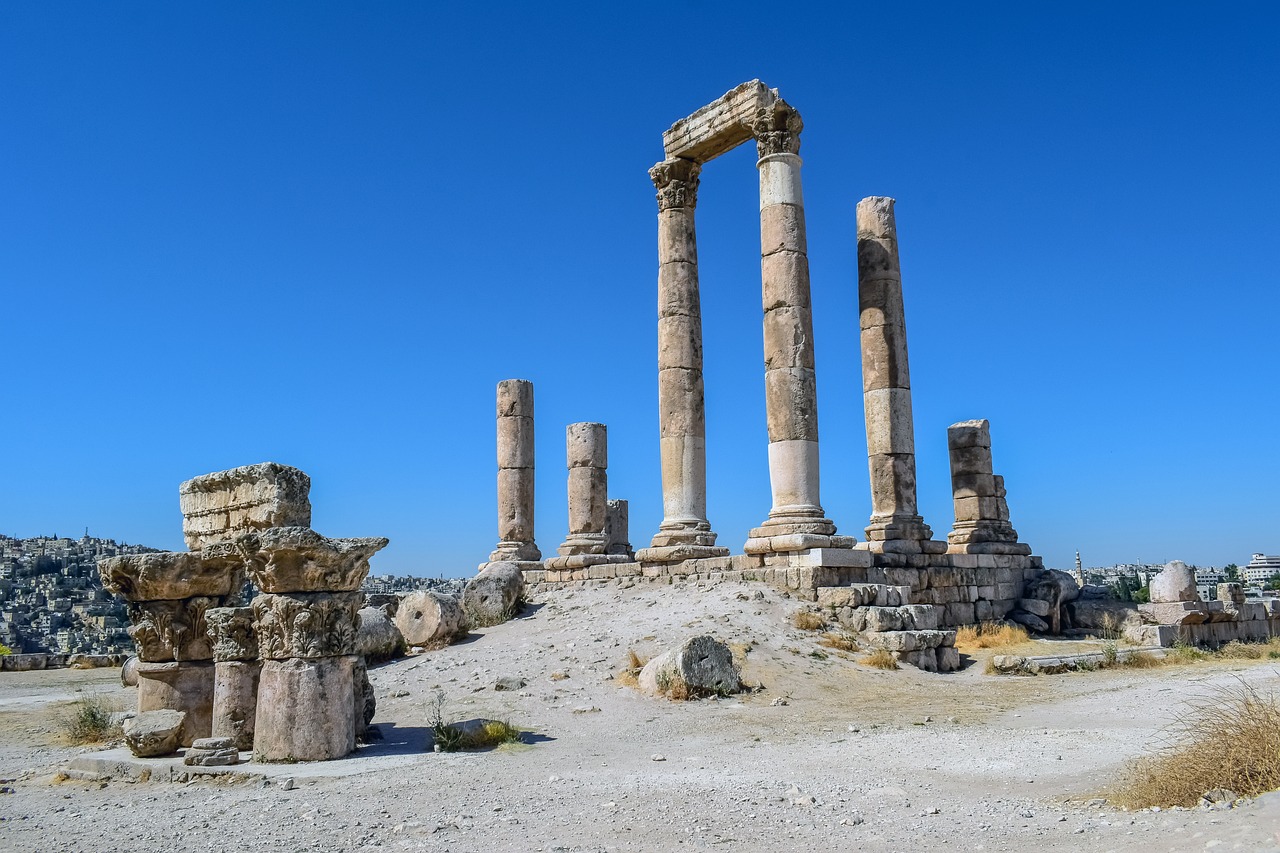
The Republic,
This article explores the foundational ideas of politics as presented in ancient philosophical texts, examining key thinkers and their contributions to political theory that continue to influence modern governance.
Plato's vision of an ideal state, as depicted in The Republic, emphasizes justice and the role of philosopher-kings in achieving a harmonious society. This section delves into his concept of the tripartite soul.
Aristotle's approach to politics is grounded in realism and empirical observation, contrasting with Plato’s idealism. This section discusses his classification of governments and the concept of the best life for citizens.
Aristotle emphasizes the importance of the polis, or city-state, as a natural community essential for human flourishing. This subheading explores his views on citizenship and civic responsibility.
In Aristotle's philosophy, virtue is central to good governance. This section examines how moral character influences political leadership and the role of ethics in public life.
Aristotle categorizes governments into three good forms and their corrupt counterparts. This analysis highlights his views on democracy, oligarchy, and monarchy, providing a framework for evaluating political systems.
Stoicism introduced a different perspective on politics, focusing on virtue and rationality. This section discusses how Stoic thinkers like Seneca and Epictetus viewed the role of individuals in society.
Cynicism challenged societal norms and questioned conventional politics. This section explores the ideas of Diogenes and how their radical views offer an alternative lens on political engagement.
Though not explicitly termed as such, early ideas of social contracts can be traced back to ancient philosophers. This subheading discusses how these concepts laid the groundwork for later political thought.
The legacy of ancient political philosophy is profound, influencing contemporary debates on governance, justice, and ethics. This section examines how these ancient ideas resonate in today's political discourse.
In The Republic, Plato articulates a vision of a society governed by wisdom and justice, where the rulers are philosopher-kings. This ideal state is structured around the concept of justice, which Plato defines as each class performing its appropriate role. The society is divided into three distinct classes: the rulers (philosopher-kings), the auxiliaries (warriors), and the producers (farmers and artisans). Each class has its own function, and the harmony among them leads to a just society. Plato famously uses the allegory of the cave to illustrate the philosopher's journey from ignorance to enlightenment, symbolizing the importance of knowledge and education in governance. He argues that only those who truly understand the forms of goodness and justice are fit to rule.
Moreover, Plato's concept of the tripartite soul mirrors his vision of the state. He posits that just as a society consists of three classes, the human soul is divided into three parts: the rational, the spirited, and the appetitive. The rational part seeks truth and wisdom, the spirited part desires honor and courage, and the appetitive part craves physical pleasures. For Plato, a just individual is one whose soul is in harmony, with reason guiding both the spirit and the appetites. This analogy between the individual and the state emphasizes the necessity of moral and intellectual development for both rulers and citizens.
In addition, Plato discusses the importance of education in shaping the guardians of the state. He believes that the rulers must undergo rigorous training in philosophy, mathematics, and dialectics to prepare them for their roles. This educational framework ensures that only the most capable individuals ascend to positions of power, thereby safeguarding the state from tyranny and corruption. Through this lens, Plato's ideal state is not merely a political structure but a reflection of the moral and intellectual virtues that should govern human life.
- What is the main idea of Plato's Republic?
The main idea of Plato's The Republic is to outline an ideal society governed by philosopher-kings, where justice prevails through the harmonious functioning of its three classes: rulers, auxiliaries, and producers. - How does Plato define justice?
Plato defines justice as each class performing its appropriate role within society, leading to a harmonious and well-ordered state. - What is the allegory of the cave?
The allegory of the cave is a metaphor used by Plato to illustrate the philosopher's journey from ignorance to enlightenment, emphasizing the importance of knowledge in achieving true understanding and governance. - Why is education important in Plato's ideal state?
Education is crucial in Plato's ideal state as it prepares the rulers to govern wisely and justly, ensuring that only the most capable individuals lead the society.
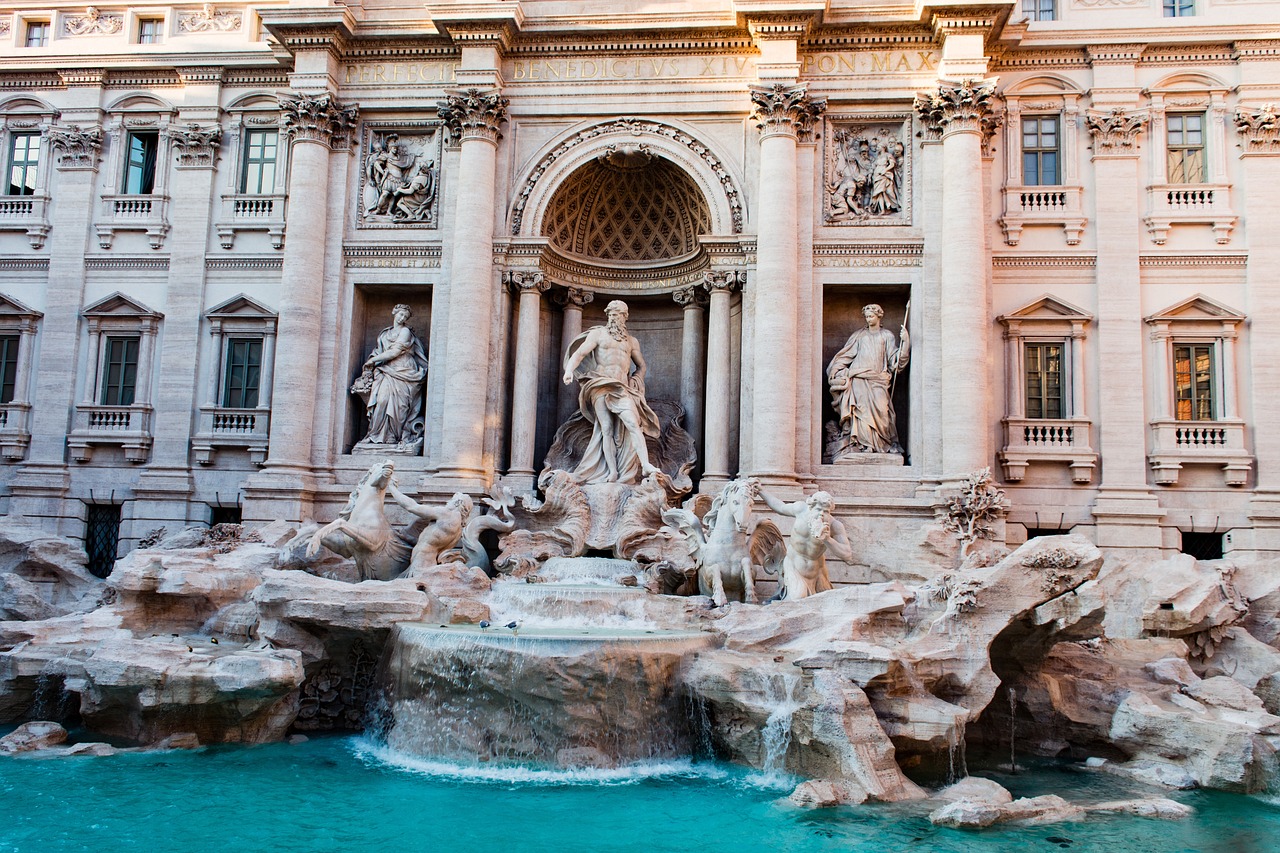
emphasizes justice and the role of philosopher-kings in achieving a harmonious society. This section delves into his concept of the tripartite soul.
Plato's vision of an ideal state, as depicted in The Republic, emphasizes justice and the pivotal role of philosopher-kings in achieving a harmonious society. Imagine a society where the rulers are not just politicians, but wise individuals who understand the essence of justice and the greater good. This is the heart of Plato's philosophy. He believed that only those who have attained true knowledge and wisdom should govern, as they can make decisions that benefit all citizens rather than a select few. In this ideal state, the philosopher-king is not merely a title; it is a representation of the highest form of leadership, where intellect and morality intertwine.
At the core of Plato's political theory is the concept of the tripartite soul. He argued that just as the state should be divided into three classes—rulers, warriors, and producers—so too should the soul be divided into three parts: the rational, the spirited, and the appetitive. Each part has its own role, and when they are in harmony, the individual achieves personal justice. The rational part seeks truth and wisdom, the spirited part embodies courage and honor, and the appetitive part desires basic needs and pleasures. For Plato, a just person is one whose rational part governs the other two, just as a just society is one where the philosopher-kings guide the citizens towards the good.
To further illustrate this concept, consider the following table that summarizes the tripartite soul and its corresponding societal roles:
| Part of the Soul | Function | Corresponding Class in Society |
|---|---|---|
| Rational | Seeks knowledge and truth | Rulers (Philosopher-Kings) |
| Spirited | Embodies courage and honor | Warriors |
| Appetitive | Desires basic needs and pleasures | Producers |
In this framework, Plato posits that a society can only flourish when its leaders are not swayed by personal desires or the whims of the masses, but rather guided by a deep understanding of justice and the common good. This idea resonates with the notion that true leadership requires a commitment to wisdom and virtue. So, what does this mean for us today? It challenges us to reflect on our own leaders and the qualities we value in them. Are they wise? Do they prioritize justice over popularity? Plato's vision serves as a reminder that the quest for a just society begins with the cultivation of wise leaders.

Aristotle's Political Realism
Aristotle, often regarded as the father of political science, approached politics with a lens of realism that starkly contrasted with Plato’s idealism. While Plato dreamt of a utopian society governed by philosopher-kings, Aristotle grounded his political theory in the realities of human nature and the empirical world. He believed that understanding the actual conditions of society was crucial for formulating effective governance. In his seminal work, Politics, Aristotle meticulously classified different forms of government, emphasizing that the best political system is one that aligns with the needs and characteristics of its citizens.
One of Aristotle's key contributions to political thought is his classification of governments into three good forms and their corrupt counterparts. He identified these as:
- Monarchy - rule by one for the common good.
- Aristocracy - rule by the few for the common good.
- Polity - rule by the many for the common good.
Each of these forms has a corresponding corrupt version: tyranny (the corrupt form of monarchy), oligarchy (the corrupt form of aristocracy), and democracy (the corrupt form of polity). Aristotle's analysis highlights a fundamental principle: the effectiveness of any government is contingent upon the virtue and moral character of its leaders. This notion leads us to ponder—can a corrupt leader ever truly serve the public good?
Aristotle posited that the best life for citizens is achieved through active participation in the political community. He believed that humans are inherently social beings, and thus, the polis—or city-state—serves as the ideal environment for individuals to realize their potential. The polis is not merely a geographical entity; it is a community where citizens engage with one another, fostering a sense of belonging and responsibility. This perspective invites us to reflect: how often do we engage in our communities, and what responsibilities do we owe to one another?
Moreover, Aristotle's political realism emphasizes the importance of virtue in governance. He argued that a ruler's moral character directly influences their ability to govern effectively. A virtuous leader is more likely to prioritize the common good over personal gain, creating a political environment where justice can flourish. In this sense, Aristotle’s ideas resonate with the modern concept of ethical leadership, prompting us to ask: are our leaders today embodying the virtues necessary for effective governance?
In summary, Aristotle's political realism provides a pragmatic framework for understanding governance. By categorizing governments and emphasizing the role of virtue, he laid the groundwork for future political thought. His insights encourage us to critically evaluate the political systems in place today and consider the moral character of those who lead. As we navigate the complexities of modern governance, Aristotle's teachings remind us that the path to a just society is paved with both ethical leadership and active civic engagement.
- What is Aristotle's view on democracy?
Aristotle viewed democracy as a corrupt form of polity, where the rule of the many can lead to the majority acting in self-interest rather than for the common good. - How does Aristotle define virtue in governance?
Virtue, for Aristotle, is the moral character of leaders, which influences their decision-making and ability to govern justly. - What is the significance of the polis in Aristotle's political theory?
The polis is crucial as it represents a community where citizens can flourish through active participation and engagement.

Polis and Community
Aristotle's concept of the polis, or city-state, is central to his political philosophy. He believed that the polis is not merely a geographical entity but rather a natural community that fosters human flourishing. In Aristotle's eyes, humans are inherently social beings, and their highest potential is realized within the context of a community. This idea resonates deeply with the notion that individuals are shaped by their social environments, much like how a tree grows stronger when surrounded by a forest. The polis, therefore, serves as the fertile ground where individuals can cultivate their virtues and engage in meaningful relationships.
Within the polis, citizenship is not just a legal status; it embodies a sense of responsibility and active participation in civic life. Aristotle argued that good citizens are those who contribute to the common good, engaging in politics not just for personal gain but for the welfare of the community. This perspective challenges the modern notion of citizenship, which often emphasizes individual rights over communal responsibilities. In Aristotle's view, the health of the polis depends on the virtue and engagement of its citizens, creating a symbiotic relationship between the individual and the community.
Moreover, Aristotle categorized citizens into different roles based on their contributions to the polis. He believed that a well-functioning community requires a variety of skills and talents, much like an orchestra needs different instruments to create harmonious music. In this sense, the polis thrives when its citizens embrace their unique abilities and work together towards common goals. This collaboration not only strengthens the community but also enriches the lives of its members, fostering a sense of belonging and purpose.
To illustrate Aristotle's views on the polis, consider the following table that outlines the key characteristics of a thriving city-state:
| Characteristic | Description |
|---|---|
| Community | A shared space where individuals interact and build relationships. |
| Civic Engagement | Active participation in political processes and community life. |
| Common Good | The welfare of the community, prioritized over individual interests. |
| Virtue | Ethical behavior that contributes to the overall health of the polis. |
In conclusion, Aristotle's vision of the polis as a community underscores the importance of citizenship and civic responsibility. By fostering a sense of belonging and encouraging active participation, the polis becomes a space where individuals can realize their potential and contribute to the greater good. This perspective not only enriches our understanding of ancient political thought but also offers valuable insights for contemporary society, reminding us that our actions within our communities shape the world around us.
- What is the significance of the polis in Aristotle's philosophy?
The polis is crucial as it represents a natural community where individuals can flourish and realize their full potential through active participation and civic responsibility.
- How does Aristotle view citizenship?
Aristotle sees citizenship as an active role that involves contributing to the common good, rather than merely holding a legal status.
- What are the key characteristics of a thriving city-state according to Aristotle?
A thriving city-state is characterized by community, civic engagement, a focus on the common good, and the cultivation of virtue among its citizens.

Virtue and Governance
In the realm of politics, virtue emerges as a cornerstone of effective governance, particularly in the philosophy of Aristotle. He posits that a ruler's moral character is not just a personal trait but a vital component that shapes the very fabric of political life. Imagine a ship sailing the turbulent seas; without a skilled captain, the vessel is doomed to drift aimlessly. Similarly, a society led by virtuous leaders is more likely to navigate the complexities of governance successfully.
Aristotle believed that the ethical conduct of leaders directly impacts the well-being of the state. When leaders embody virtues such as justice, wisdom, and courage, they inspire trust and loyalty among citizens. This trust is essential for fostering a cohesive community, where individuals feel invested in the collective good. It raises an important question: can a society truly thrive under the guidance of leaders lacking in moral integrity?
To further illustrate Aristotle's perspective, consider the following attributes that define virtuous governance:
- Justice: Ensuring fairness in laws and policies.
- Wisdom: The ability to make sound decisions based on knowledge and experience.
- Courage: The strength to uphold moral principles, even in the face of adversity.
These virtues not only shape the leaders but also serve as a model for citizens, encouraging them to engage in civic duties with a sense of responsibility. Aristotle argues that a virtuous ruler cultivates a virtuous populace, creating a cycle of positive influence that strengthens the state. Thus, the ethical framework of governance becomes a shared bond between the ruler and the ruled, where each party plays an integral role in the health of the political system.
Moreover, Aristotle's emphasis on virtue extends to the notion of moral education. He believed that leaders should be well-educated in ethics, philosophy, and the art of governance. This education equips them to make decisions that not only serve their interests but also promote the common good. In a way, it's akin to a gardener tending to a garden: without proper knowledge and care, the garden will wither. Likewise, without virtuous leaders, a society may struggle to flourish.
In summary, the relationship between is a dynamic interplay that defines the success of political systems. As Aristotle suggests, when leaders are virtuous, they not only guide their citizens towards a better life but also ensure that the state remains resilient against corruption and tyranny. This timeless wisdom continues to resonate today, reminding us that the moral character of our leaders is paramount in shaping a just and equitable society.
- What is the role of virtue in governance? Virtue is essential for effective governance as it ensures that leaders act in the best interest of their citizens, fostering trust and social cohesion.
- How does Aristotle define a virtuous leader? A virtuous leader, according to Aristotle, embodies qualities like justice, wisdom, and courage, which are crucial for ethical decision-making and public trust.
- Can a society thrive without virtuous leaders? It's challenging for a society to thrive under leaders lacking moral integrity, as this can lead to corruption and a disconnect between the government and its citizens.

Forms of Government
Aristotle’s exploration of political systems is as profound as it is practical. He categorizes governments into three ideal forms, each with its own corrupt counterpart. This classification is not just academic; it serves as a lens through which we can evaluate the effectiveness and morality of our current political structures. The three good forms of government, according to Aristotle, are monarchy, aristocracy, and polity, while their corrupt versions are tyranny, oligarchy, and democracy, respectively.
Let’s break this down a bit further. A monarchy is ruled by a single individual, ideally a wise and virtuous king. However, when that power is abused, it becomes a tyranny, where the ruler seeks personal gain over the common good. Similarly, an aristocracy is governed by a select group of the best and brightest, yet this can devolve into an oligarchy, where a few wealthy individuals prioritize their interests above those of the populace.
Lastly, Aristotle’s concept of polity represents a mixed government that seeks to balance the interests of the wealthy and the poor. This form encourages participation from all citizens, yet can fall into the chaos of a democracy, where the masses may make decisions that undermine the stability of the state. Aristotle warns that while democracy allows for freedom, it can lead to mob rule if not properly checked.
To illustrate this further, consider the following table that summarizes Aristotle's forms of government and their corrupt counterparts:
| Good Form | Corrupt Form |
|---|---|
| Monarchy | Tyranny |
| Aristocracy | Oligarchy |
| Polity | Democracy |
In understanding these forms, we can better appreciate the delicate balance that must be maintained in governance. Each system has its strengths and weaknesses, and the challenge lies in striving for the ideal while being aware of the potential for corruption. Aristotle’s insights remind us that political systems are not static; they require constant vigilance and active participation from citizens to uphold their integrity.
As we navigate through modern political landscapes, Aristotle's classifications serve as a timeless guide, urging us to reflect on the nature of power, the responsibilities of leadership, and the role of citizens in shaping the governance of their communities.
- What are the three good forms of government according to Aristotle?
Aristotle identifies monarchy, aristocracy, and polity as the three ideal forms of government. - What are the corrupt forms of these governments?
The corrupt forms corresponding to Aristotle's ideal governments are tyranny, oligarchy, and democracy. - Why is Aristotle's classification of governments still relevant today?
Aristotle’s insights provide a framework for evaluating modern political systems and remind us of the importance of civic engagement.
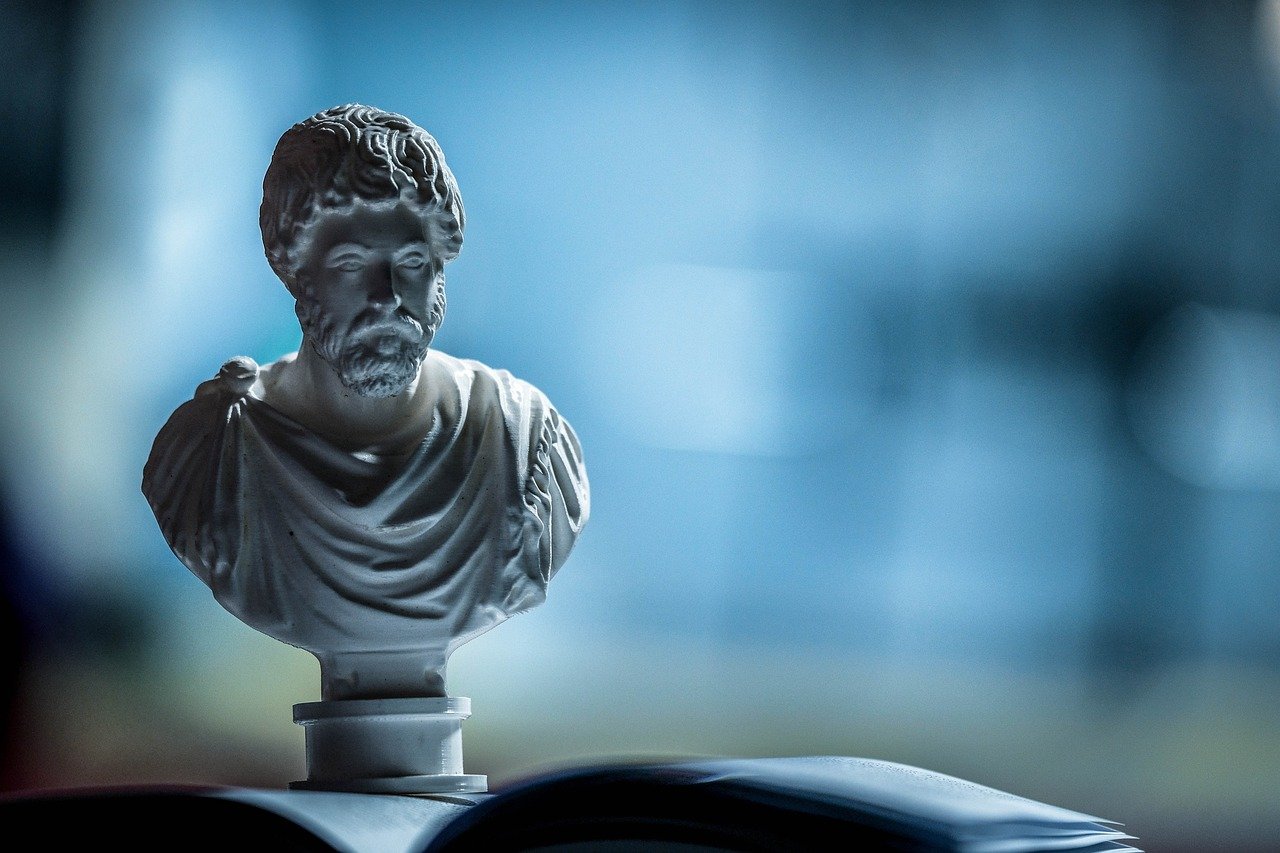
Stoicism and Political Philosophy
Stoicism, a school of thought that originated in ancient Greece, presents a unique lens through which to view political philosophy. At its core, Stoicism emphasizes the importance of virtue and rationality in both personal conduct and governance. Thinkers like Seneca and Epictetus articulated the belief that true happiness comes not from external circumstances but from within, a principle that profoundly influences their views on politics. In a world rife with chaos and uncertainty, Stoicism teaches that individuals should focus on what they can control—primarily their own actions and reactions. This focus on personal responsibility extends to political engagement, suggesting that citizens have a duty to act virtuously within their communities.
One of the key tenets of Stoic philosophy is the idea of cosmopolitanism, which posits that all human beings are part of a larger, interconnected community. Stoics believed that because we share a common rationality, we should strive for the common good, transcending local or national loyalties. This perspective encourages a sense of global citizenship, where individuals recognize their responsibility not just to their immediate community but to humanity as a whole. The Stoic ideal of a wise ruler—someone who governs with justice and virtue—echoes through the ages, reminding us that political leaders should prioritize the welfare of their citizens over personal ambition.
Furthermore, Stoicism advocates for the importance of self-discipline and emotional resilience in governance. A Stoic leader is expected to remain calm and rational, even amidst turmoil, making decisions based on reason rather than passion. This approach is particularly relevant in today’s political climate, where emotional appeals often overshadow rational discourse. By promoting a political culture rooted in Stoic principles, societies can cultivate leaders who are better equipped to navigate the complexities of governance, fostering a more stable and just political environment.
To illustrate the Stoic perspective on political engagement, consider the following key ideas:
- Virtue as the Foundation of Governance: A government led by virtuous individuals is more likely to promote justice and the common good.
- Rational Decision-Making: Leaders should prioritize logic and reason over emotional reactions, ensuring that policies are based on sound principles.
- Global Responsibility: Citizens should view themselves as part of a broader community, acting in ways that benefit not just their local society but humanity as a whole.
In conclusion, Stoicism offers profound insights into political philosophy that remain relevant today. By emphasizing virtue, rationality, and a sense of global responsibility, Stoic thinkers encourage individuals to engage in political life with integrity and purpose. This philosophical framework not only shapes our understanding of governance but also inspires us to cultivate a society where ethical leadership and civic responsibility are paramount.
Q: What is Stoicism?
A: Stoicism is an ancient Greek philosophy that teaches the development of self-control and fortitude as a means to overcome destructive emotions. It emphasizes rationality and virtue as the path to a good life.
Q: How does Stoicism relate to politics?
A: Stoicism influences political philosophy by advocating for virtuous leadership, rational decision-making, and a sense of responsibility towards the global community.
Q: Who are some key Stoic philosophers?
A: Prominent Stoic philosophers include Seneca, Epictetus, and Marcus Aurelius, each of whom contributed significantly to the understanding of Stoic principles and their application in daily life and governance.
Q: Can Stoicism be applied in modern governance?
A: Yes, Stoic principles can guide modern governance by promoting ethical leadership, emotional resilience, and a focus on the common good, encouraging leaders to prioritize rational policies over emotional appeals.

Cynicism and Political Critique
Cynicism, as a philosophical movement, emerged as a radical critique of the social and political norms of its time. The Cynics, most famously represented by Diogenes of Sinope, challenged the prevailing values of society, advocating for a life lived in accordance with nature and rejecting materialism and social conventions. Their philosophy was not just a philosophical stance but a form of political engagement that questioned the very foundations of governance and societal structure.
Diogenes, often depicted as a figure living in a barrel, used his lifestyle as a form of protest against the excesses and pretensions of Athenian society. He famously wandered the streets with a lantern in broad daylight, claiming to be searching for an honest man. This act was not merely eccentric; it was a profound statement about the corruption and hypocrisy he perceived in the political leaders of his time. The Cynics believed that true happiness could only be found through self-sufficiency and virtue, rejecting the idea that wealth or status could bring fulfillment.
The political critique offered by the Cynics can be seen as a precursor to modern forms of dissent and activism. They argued that conventional politics often served the interests of the powerful rather than the common good. Their radical honesty and disdain for societal norms encourage individuals to question authority and the status quo. This perspective resonates today, as we witness movements that challenge established political systems and advocate for transparency and integrity in governance.
Moreover, Cynicism's emphasis on individual virtue over societal approval raises critical questions about the role of the citizen in a political landscape. In a world where social media often distorts reality and promotes superficial values, the Cynics remind us of the importance of authenticity and personal integrity. They suggest that true political engagement requires a commitment to living a virtuous life, even in the face of societal pressure to conform.
In addition to Diogenes, other Cynic philosophers like Crates of Thebes and Menippus contributed to this critique by illustrating how philosophical ideals could be applied to everyday life. Their teachings often included parables and anecdotes that highlighted the absurdities of social norms, encouraging individuals to embrace a more straightforward and honest approach to life. This method of using humor and irony to critique societal flaws remains relevant in contemporary political discourse, where satire often serves as a powerful tool for social commentary.
In conclusion, the Cynics offer a unique lens through which we can examine the relationship between philosophy and politics. Their radical critiques and emphasis on virtue challenge us to reconsider our own political engagement and the values we uphold. By advocating for a life of simplicity and integrity, the Cynics not only critiqued the political systems of their time but also laid the groundwork for future generations to question and redefine the nature of governance and civic responsibility.
- What is Cynicism in philosophy? Cynicism is a philosophical movement that advocates for living in accordance with nature, rejecting societal conventions and materialism.
- Who was Diogenes of Sinope? Diogenes was a prominent Cynic philosopher known for his ascetic lifestyle and sharp critiques of social norms and political hypocrisy.
- How does Cynicism relate to modern political thought? Cynicism encourages questioning authority and societal values, emphasizing personal integrity and virtue, which resonates with contemporary movements for social justice and political reform.

Social Contract Theory
The concept of the social contract has deep roots in ancient philosophy, even if it wasn't explicitly labeled as such. Think of it as the unwritten agreement that binds individuals to one another and to the state. Ancient philosophers like Plato and Aristotle hinted at these ideas, suggesting that society is built on a foundation of mutual obligations and collective responsibility. Imagine a group of people agreeing to live together, sharing resources and responsibilities, all in pursuit of a common good. This is the essence of the social contract.
In Plato's works, particularly in The Republic, he presents a vision where individuals contribute to society's well-being based on their abilities and roles. He suggests that justice arises when everyone fulfills their part in this collective endeavor. In this sense, the social contract is about more than just laws; it's about harmony and balance within the community. It's like a well-tuned orchestra, where each musician plays their part, contributing to a beautiful symphony.
Aristotle, on the other hand, took a more pragmatic approach. He viewed the polis, or city-state, as a natural community that emerges from human relationships. For Aristotle, the social contract is not merely theoretical; it is grounded in the reality of human nature and the necessity of social interaction. He believed that humans are inherently social beings, and thus, the formation of a government is a natural progression in human development. This leads us to consider how individuals come together to form a society, creating a framework for governance based on mutual respect and shared goals.
While the term "social contract" wasn't coined until later, its principles can be traced back to these ancient thinkers. They laid the groundwork for later philosophers, such as Hobbes, Locke, and Rousseau, who expanded upon these ideas. They explored questions like: What do individuals give up to live in a society? What are the limits of governmental power? And importantly, what happens when the social contract is broken?
To better understand the evolution of social contract theory, let's take a look at how these ancient ideas influenced later thinkers:
| Philosopher | Key Ideas | Contribution to Social Contract Theory |
|---|---|---|
| Plato | Justice in society, roles of individuals | Emphasized harmony and collective responsibility |
| Aristotle | Natural community, civic engagement | Focused on the importance of the polis and citizenship |
| Hobbes | Social order, necessity of a strong ruler | Introduced the idea of surrendering rights for protection |
| Locke | Natural rights, government by consent | Advocated for personal liberty and the right to revolt |
| Rousseau | General will, collective sovereignty | Proposed that true freedom comes from participation in governance |
As we can see, the ancient roots of social contract theory have significantly shaped modern political thought. The idea that individuals consent to form a society and abide by its rules remains a cornerstone of contemporary governance. It raises critical questions about the nature of authority, the rights of individuals, and the responsibilities of the state. In a way, it's like a dance: both the government and the citizens must move in sync to create a stable and just society. When one party falters, the entire system risks falling out of balance.
In conclusion, the social contract theory, even in its nascent form, has profound implications for our understanding of politics. It serves as a reminder that our political systems are built on the foundations of mutual agreement and shared values. As we navigate the complexities of modern governance, reflecting on these ancient ideas can provide valuable insights into the ongoing dialogue about rights, responsibilities, and the role of the state in our lives.
- What is the social contract theory?
It is the idea that individuals consent to form a society and abide by its rules, creating a framework for governance based on mutual obligations. - Who were the main philosophers associated with social contract theory?
Key figures include Plato, Aristotle, Hobbes, Locke, and Rousseau, each contributing unique perspectives on the concept. - How does social contract theory influence modern politics?
It underpins many contemporary discussions about governance, individual rights, and the responsibilities of the state.

Influence on Modern Political Thought
The echoes of ancient political philosophy resonate profoundly in today's political landscape. Think about it: the fundamental questions of governance, justice, and the role of the individual in society were all explored by thinkers like Plato and Aristotle centuries ago. Their ideas didn’t just vanish into the annals of history; instead, they laid the groundwork for modern political thought, shaping how we view authority, power, and civic responsibility.
For instance, Plato's concept of the philosopher-king has influenced contemporary discussions about leadership. The idea that those in power should be wise and virtuous rather than merely politically savvy is something that still sparks debate today. Many argue that today's leaders should embody the ethical standards that Plato envisioned, ensuring that their governance promotes the common good.
Similarly, Aristotle's pragmatic approach to politics offers a stark contrast to idealism. His classification of governments and the emphasis on empirical observation can be seen in modern political science. Think tanks and political analysts often draw upon Aristotle’s insights to evaluate current regimes and propose improvements. His belief that politics should serve the purpose of achieving the best life for citizens continues to inspire democratic ideals worldwide.
Moreover, the Stoic emphasis on virtue and rationality has found a new audience in contemporary discussions about ethics in politics. Leaders today are often scrutinized for their moral character, reflecting Stoic principles that prioritize integrity and rational decision-making in governance. The Stoic idea that individuals have a role in shaping society resonates strongly in movements advocating for social justice and civic engagement, urging citizens to take responsibility for their communities.
Interestingly, the Cynics, with their radical critiques of societal norms, have also influenced modern political thought. Their challenge to conventional politics and advocacy for authenticity can be seen in contemporary social movements that question the status quo. The spirit of Diogenes, who famously lived in a barrel and rejected materialism, echoes in today’s calls for transparency and accountability from those in power.
In essence, the legacy of ancient political philosophy is not just a relic of the past; it's a vibrant part of our current discourse. The principles laid out by these thinkers continue to inform debates on governance, justice, and ethics, reminding us that the questions they posed are still relevant. As we navigate the complexities of modern politics, we can look back to these foundational ideas for guidance and inspiration.
- How do ancient political philosophies influence modern governance? Ancient philosophies provide foundational ideas about justice, ethics, and leadership that continue to shape contemporary political theories and practices.
- What is the significance of the philosopher-king concept? The philosopher-king represents the ideal leader who possesses wisdom and virtue, suggesting that those in power should prioritize the common good over personal ambition.
- Are Stoic principles relevant in today's political climate? Yes, Stoic principles emphasize integrity and rationality, which are increasingly important in discussions about ethical leadership and civic responsibility.
- How do Cynical critiques apply to modern politics? Cynical critiques encourage questioning societal norms and holding leaders accountable, resonating with today's movements advocating for transparency and authenticity in governance.
Frequently Asked Questions
- What is Plato's vision of an ideal state?
Plato envisioned an ideal state characterized by justice and ruled by philosopher-kings. In his work, The Republic, he argues that these enlightened rulers are best equipped to create a harmonious society, as they possess the wisdom necessary to govern justly.
- How does Aristotle's political realism differ from Plato's idealism?
Aristotle's political realism is grounded in empirical observation and practical governance, contrasting with Plato's abstract ideals. While Plato focused on the concept of the perfect state, Aristotle analyzed existing governments and emphasized the importance of achieving the best life for citizens through realistic political structures.
- What role does the polis play in Aristotle's philosophy?
For Aristotle, the polis, or city-state, is a natural community essential for human flourishing. He believed that citizenship and civic responsibility are vital for the well-being of individuals and the community as a whole, highlighting the interconnectedness of personal and political life.
- How does virtue influence governance in Aristotle's view?
In Aristotle's philosophy, virtue is central to effective governance. He posits that moral character shapes political leadership, suggesting that virtuous leaders are more likely to make ethical decisions that benefit the public and promote a just society.
- What are the three good forms of government according to Aristotle?
Aristotle categorizes governments into three good forms: monarchy, aristocracy, and polity. Each has a corresponding corrupt counterpart: tyranny, oligarchy, and democracy. His framework allows for evaluating the strengths and weaknesses of different political systems.
- What perspective does Stoicism offer on politics?
Stoicism introduces a focus on virtue and rationality in political philosophy. Thinkers like Seneca and Epictetus emphasized the role of individuals in society, advocating for a life guided by reason and moral integrity, which they believed could lead to a more just political environment.
- How did Cynicism critique conventional politics?
Cynicism, as represented by figures like Diogenes, challenged societal norms and questioned the validity of conventional politics. Their radical views encouraged individuals to live authentically and reject materialism, offering an alternative perspective on political engagement and social responsibility.
- What is social contract theory in ancient philosophy?
Although not explicitly termed as such, early ideas of social contracts can be traced back to ancient philosophers. These concepts laid the groundwork for later political thought, suggesting that the legitimacy of political authority comes from the agreement of the governed.
- How does ancient political philosophy influence modern thought?
The legacy of ancient political philosophy is profound, shaping contemporary discussions on governance, justice, and ethics. Many modern political theories still resonate with the ideas presented by ancient thinkers, illustrating the lasting impact of their work on today's political discourse.






